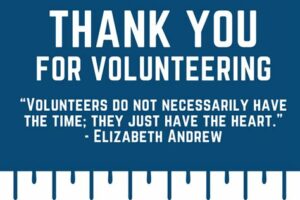Table of Contents
Discover how to effectively showcase your volunteer work on your resume. Learn the best practices for highlighting your experience, skills gained, and impact made while volunteering. Enhance your chances of landing your dream job by including your volunteer work in a professional and compelling manner.
When it comes to crafting a compelling resume, highlighting volunteer work can be a powerful way to grab the attention of potential employers. Not only does volunteering demonstrate your commitment to giving back to the community, but it also showcases valuable skills and experiences that can set you apart from other candidates. By strategically incorporating your volunteer work into your resume, you can effectively showcase your dedication, versatility, and passion for making a difference.
How to Add Volunteer Work on Your Resume
Volunteering can be a fulfilling and enriching experience, allowing you to give back to your community and make a positive impact. It also provides an opportunity to gain valuable skills and experiences that can enhance your professional development. Adding volunteer work on your resume can demonstrate your commitment, dedication, and willingness to contribute beyond your job responsibilities. In this article, we will discuss how to effectively incorporate volunteer work onto your resume.
Choose Relevant Volunteer Experiences
When deciding which volunteer experiences to include on your resume, it is important to select those that are relevant to the job or industry you are applying for. Look for experiences that align with the skills, qualifications, and values sought by employers in your desired field. For example, if you are applying for a position in healthcare, including volunteer work at a local hospital or clinic would be highly relevant.
Include a Separate Volunteer Section
One effective way to highlight your volunteer work is by creating a separate section dedicated specifically to it on your resume. This allows you to showcase your volunteer experiences without overshadowing your professional work history. Label the section as Volunteer Experience or Community Involvement and list each experience with relevant details such as the organization name, your role, and the duration of your involvement.
Highlight Transferable Skills
While volunteer work may not always directly relate to your desired job, it often provides opportunities to develop transferable skills that are valued in the workplace. These skills can include leadership, teamwork, communication, problem-solving, and organization. When describing your volunteer experiences, emphasize these transferable skills by providing specific examples of how you demonstrated them during your service.
Quantify Your Contributions
To add credibility to your volunteer work, consider quantifying your contributions whenever possible. For instance, if you organized a fundraising event, state the amount of money raised or the number of participants involved. This helps potential employers understand the impact you made and the level of responsibility you held in your volunteer role.
Use Action Verbs
When describing your volunteer experiences, use strong action verbs to effectively communicate your responsibilities and accomplishments. Action verbs such as led, organized, coordinated, initiated, or managed can convey your active involvement in the volunteer activities. This helps create a dynamic and engaging description that captures the attention of employers.
Tailor Your Descriptions
Just like your professional work experience, it is essential to tailor the descriptions of your volunteer work to each specific job application. Carefully review the job requirements and description, then adjust your volunteer experience descriptions to highlight the skills and qualities most relevant to the position. This customization demonstrates your understanding of the employer’s needs and increases the chances of catching their attention.
Include Relevant Achievements
Did you receive any accolades or recognition for your volunteer work? If so, be sure to include it on your resume. Recognitions such as awards, certificates, or letters of appreciation can showcase your dedication and the quality of your contributions. Including these achievements adds an extra layer of credibility to your volunteer experiences.
Show Consistency and Commitment
Employers value consistency and commitment, both in professional and volunteer settings. If you have long-term volunteer experiences, make sure to highlight them on your resume. Demonstrating your commitment to a cause or organization over an extended period illustrates reliability and dedication, which are highly sought-after qualities by employers.
Provide Relevant References
If possible, include references from your volunteer experiences. These references can be supervisors or colleagues who can vouch for your skills, work ethic, and dedication. By providing references, you offer employers an opportunity to verify the quality of your volunteer work and gain additional insights into your character and capabilities.
Keep it Honest and Concise
Lastly, always be truthful and concise when describing your volunteer experiences. Avoid embellishing or exaggerating your responsibilities or achievements. Instead, focus on key details that highlight your skills, impact, and dedication. Keep the descriptions succinct and relevant, as lengthy explanations may dilute the impact of your volunteer work.
Incorporating volunteer work onto your resume can significantly enhance your overall profile and demonstrate your commitment to making a difference. By following these tips, you can effectively showcase your volunteer experiences and increase your chances of landing the job you desire.
Adding volunteer work to your resume can greatly enhance your professional profile and demonstrate your dedication to community involvement. It is essential to carefully select volunteer experiences that align with the skills and qualifications required for the job you are applying for. Once you have identified relevant volunteer work, create a separate section on your resume to highlight these experiences.When including your volunteer work, provide a detailed description of your responsibilities and tasks undertaken during your service. This will allow potential employers to understand the impact you made and the skills you gained through your volunteer experience. Be concise yet comprehensive in describing your contributions, making sure to emphasize any transferable skills acquired.Volunteering often provides opportunities to develop key skills that can be applied to various career paths. These transferable skills, such as leadership, teamwork, problem-solving, and communication, should be highlighted to showcase your versatility and adaptability to potential employers. Emphasizing these skills will make your volunteer work even more valuable and attractive to hiring managers.To make your volunteer work stand out, quantify your impact and achievements whenever possible. For example, mention the number of people you helped, the amount of funds you raised, or any awards or recognition received during your volunteer experience. This will demonstrate your ability to make a measurable impact and generate results, further strengthening your resume.Just as you tailor your professional work experience to fit the job you are applying for, it is essential to customize your volunteer experience as well. Highlight volunteer work that directly relates to the industry or skills sought by the employer. Clearly articulate how this experience makes you a strong candidate for the specific role you are pursuing.Depending on the nature of your volunteer work, you have two options for its placement on your resume. If your volunteer experience closely aligns with your professional work history, consider including it in the same section under your work experience. This will demonstrate your commitment and dedication to personal growth and community involvement throughout your career.Alternatively, if you have multiple volunteer experiences or if they are not closely related to your professional work, create a separate section on your resume dedicated solely to volunteer work. This ensures that your volunteer experience receives the attention it deserves and demonstrates your commitment to giving back.To maintain a professional appearance, use consistent formatting and styling when including volunteer work on your resume. Ensure that it follows the same conventions as the rest of your document, using consistent bullet points, font styles, and spacing. This will create a cohesive and visually appealing resume that highlights all aspects of your qualifications, including your volunteer work.In conclusion, adding relevant volunteer work to your resume is a powerful way to demonstrate your commitment to community involvement and showcase transferable skills. By highlighting your responsibilities, quantifying your impact, and tailoring your volunteer experiences to the specific job, you can effectively present yourself as a strong candidate to potential employers. Whether included in the work experience section or showcased separately, your volunteer work should be formatted consistently with the rest of your resume to create a professional and cohesive document.
How to Add Volunteer Work on Resume
When it comes to crafting a professional resume, it is crucial to showcase not only your work experience but also any volunteer work you have undertaken. Adding volunteer work to your resume can demonstrate your commitment to community involvement, highlight your transferable skills, and show potential employers your diverse interests. Here are some tips on how to effectively incorporate volunteer work into your resume:
- Include a dedicated section: Create a separate section on your resume specifically for volunteer work. This will ensure that your volunteer experiences receive the attention they deserve.
- Provide relevant details: For each volunteer position, provide the name of the organization, your role or title, the dates you volunteered, and a brief description of your responsibilities. This information helps recruiters gain a better understanding of your involvement and the skills you gained.
- Highlight transferable skills: Emphasize the skills you acquired or enhanced through your volunteer work that are applicable to the job you are applying for. These may include leadership, teamwork, communication, problem-solving, or organizational skills.
- Quantify your impact: Whenever possible, quantify the impact you made during your volunteer work. For example, mention the number of people you helped, the amount of money you raised, or the projects you completed successfully. This demonstrates your ability to make a tangible difference.
- Focus on relevant experiences: If you have volunteered in multiple organizations or roles, prioritize those that align most closely with the job you are seeking. Tailor your descriptions to highlight the aspects of your volunteer work that are most relevant to the position.
- Show consistency: If you have been involved with a particular organization or cause for an extended period, it indicates your commitment and dedication. Highlight long-term volunteer experiences to showcase your reliability and passion.
- Emphasize leadership roles: If you have held leadership positions within volunteer organizations, make sure to highlight these roles on your resume. Leadership experience demonstrates your ability to take initiative, manage projects, and work collaboratively with others.
- Use professional language: When describing your volunteer work, use professional language and tone that aligns with the rest of your resume. This will help ensure consistency and convey your professionalism to potential employers.
Incorporating volunteer work into your resume can provide a valuable edge in today’s competitive job market. By following these guidelines and presenting your volunteer experiences in a clear and compelling manner, you can effectively demonstrate your well-rounded skillset and commitment to making a difference in your community.
Dear valued blog visitors,Thank you for taking the time to read our article on how to add volunteer work on your resume. We understand that showcasing your volunteer experience can be a valuable asset when it comes to standing out in today’s competitive job market. By incorporating your volunteer work into your resume, you not only demonstrate your commitment to making a difference in your community but also highlight transferable skills that can make you a desirable candidate for potential employers.
When it comes to including volunteer work on your resume, it’s essential to strategically position this information to maximize its impact. One effective way to do this is by creating a dedicated section specifically for your volunteer experience. This section should be placed after your professional work history, education, and skills sections. By doing so, you show potential employers that you consider your volunteer work to be just as important as your paid employment, emphasizing your dedication to social causes and community engagement.
Within this dedicated section, be sure to provide detailed information about your volunteer roles. Start by listing the name of the organization or cause you volunteered for, followed by the dates of your involvement. Include a brief description of your responsibilities and achievements during your time as a volunteer. This will give potential employers an understanding of the specific skills and experiences you gained while giving back to your community.
Transition words such as in addition, furthermore, and moreover can be used to smoothly connect different aspects of your volunteer experience. For example, when discussing your responsibilities, you could say, In addition to organizing fundraising events, I was responsible for managing a team of volunteers, ensuring seamless coordination of efforts. These transition words help create a cohesive flow within your resume, making it easier for employers to understand the value you bring as a candidate.
In conclusion, incorporating your volunteer work on your resume can significantly enhance your chances of landing your dream job. By strategically positioning this information and providing detailed descriptions of your responsibilities and achievements, you demonstrate your commitment to social causes and showcase transferable skills that can contribute to your professional success. Remember to use transition words to create a smooth and cohesive narrative throughout your resume. Good luck in your job search, and we hope this article has been helpful in your journey to add volunteer work to your resume.
Best regards,[Your Name].
People also ask about how to add volunteer work on a resume:
Should I include volunteer work on my resume?
Yes, including volunteer work on your resume can be beneficial, especially if it is relevant to the job you are applying for or demonstrates valuable skills. It shows that you are committed, responsible, and have a strong work ethic.
Where should I place my volunteer work on my resume?
You can include your volunteer work in various sections of your resume, depending on its relevance. If the volunteer work directly relates to the job you are applying for, you can create a separate section titled Volunteer Experience or Community Involvement and list the details there. Otherwise, you can mention it in your work experience section or under a separate Additional Activities section.
How do I describe my volunteer work on a resume?
When describing your volunteer work on a resume, focus on the skills you gained and the impact you made. Use action verbs and quantifiable achievements to showcase your responsibilities and accomplishments. Highlight any leadership roles, projects you completed, or specific outcomes you achieved while volunteering.
Can I list volunteer work if I didn’t have a formal position?
Absolutely! Volunteer work does not always require formal positions. Even if you didn’t have a designated title, you can still include the organization you volunteered for, the dates of your involvement, and a brief description of your responsibilities or tasks performed. This demonstrates your willingness to contribute and your involvement in community initiatives.
What if I have limited volunteer work experience?
If you have limited volunteer work experience, focus on the quality of your involvement rather than quantity. Highlight any transferable skills or relevant experiences gained through volunteer work. Additionally, you can include any relevant coursework, certifications, or workshops you have completed to showcase your dedication and commitment.
Remember, adding volunteer work to your resume can help you stand out from other candidates and showcase your diverse experiences and skills. Tailor your resume to highlight the most relevant volunteer work for each job application.






